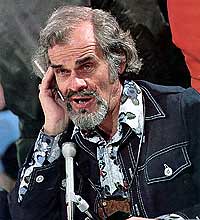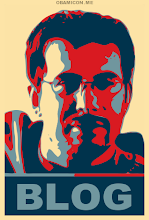Innocence Lost
The Passing Of King Is More Than Baseball Or The Man
I cried when I heard of the passing of Bay Area sports icon, Bill King. I cried the same as if a close friend died today.
Bill King was more widely noted as a football announcer for the Oakland Raiders and the voice of the Golden State Warriors, but his moved to his so-called "third sport" of baseball for the Oakland A's in 1981, coincided with my indoctrination to the ritual and daily movements of the game of baseball.
From Billy Ball to the Bash Brothers to the Big Three of Zito, Mulder and Hudson, Bill King was the soundtrack to so many memorable and warm feelings during my childhood.
For 25 fortunate years I've been blessed to signal the rites of spring with the voice of Bill King on my radio. When I started driving, the tradition of tuning into that one fortunate Saturday afternoon in March when the A's beamed their first telecast from the desert in Arizona was bliss. His silky voice dripping with the complexity of fine wine gave life to my hibernating baseball urges. Bill King is back and a new baseball season would soon commence.
He was quite possibly the most overly prepared human ever. His descriptions of so many failed prospects and non-roster players during the spring were indistinguishable from the well-known stars. The knowledge behind Jose Tolentino, Daryl Sconiers and Larry Arndt was as precise as the unmistakable stars of Canseco, McGwire, Giambi, Chavez and Tejada.
His partners in the booth always mentioned his proclivity for the fine things in life. What made him much more than just some disc jockey in the booth was his rich background. On numerous occasions, he would talk with Ray Fosse, Ken Korach or Lon Simmons about the fantastic dinner he had at some fine restaurant in whatever American League town they were visiting. He was walking Chamber of Commerce for the city of Sausalito. You sensed that he enjoyed the arts, literature and jazz as much as he did calling an extra inning game in the heat of the pennant race. For that, he had the interesting and fun, but firm grandfatherly hand.
He may have been subliminally saying through my speakers, "Baseball is fun, little Stevie, but make sure you finish your book report before tuning in to the A's game."
When I worked for the A's during the trying 1996 and 1997 seasons, I had the pleasure to work in the pressbox where he plied his trade. I only spoke with him on two occasions, the excitement from those brief conversations were only exceeded by having Rickey Henderson greet me after a night game.
The path to the Coliseum's pressbox is made through a double-door elevator similar to one you find at any hospital. He was standing in front of the elevator door when my supervisor and I walked up on him. When the elevator arrived the three of us entered. There was some typical elevator awkwardness as I turned and faced the elevator door that we had just entered.
King broke the silence and said, "How ya doing, son?"
"Fine. Thank you," I said.
I couldn't believe that the voice that I had been listening to all these years was now addressing me!
"So, you're going to be working up here with us?."
I just nodded as my supervisor answered, "Yeah, we'll see how he does."
Just then the elevator began to slow before the door opened. I turned and fully faced the elevator doors awaiting their opening but they didn't move.
King quickly uttered, "Well, good luck!" and passed through the elevator door behind me. I felt so stupid. I had no idea that there were two doors in the elevator.
King would always walked around the pressbox sans shoes and socks and his habit of eating raw onions in the booth seemed way out there, but typical for a man accustomed to his own individuality. The loss of someone so unique and pure in his reverance to reporting the details of every A's game will take time for many fans to get accustomed to.
It will feel strange next season not feeling Bill King's familiar cadence when Eric Chavez knocks that first homer over the rightfield wall. The game might feel imcomplete without his amazing postgame synopsis. But, for many of us who have listened faithfully for the last 25 years of A's baseball or those fortunate enough to have had Bill King's voice in their transistor radios since 1962; you know that change happens in all parts of our lives. Children are born. Loved ones pass. More hours are needed at the factory to pay the bills and paying attention the daily pulse of your baseball team slowly drops from being the most important part of your life.
Today, the loss of radio announcer Bill King is also a reminder of those wonderful childhood days when learning how to throw your first curveball was the most exciting thing in your life and mimicking The Eck's throwing motion was as precise as writing your name in cursive for the first time.
Bill King called all of the great moments in my A's history but he also called our wiffle ball games in my front yard and undoubtedly many more from Berkeley to Fremont. The play-by-play probably went something like this:
"Steve sets...He winds...The Pitch. Bobby hits a high fly ball. Suzie's at the track. She looks up. It's GONE!. Bobby has just hit a three-run homer over the neighbor's fence to win the game!....Holy Toledo!
Be with us tomorrow at 7:05 first pitch, pregame starting at 5:30 with Marty Lurie's Right off the Bat..."
Thanks, Bill.
I cried when I heard of the passing of Bay Area sports icon, Bill King. I cried the same as if a close friend died today.
Bill King was more widely noted as a football announcer for the Oakland Raiders and the voice of the Golden State Warriors, but his moved to his so-called "third sport" of baseball for the Oakland A's in 1981, coincided with my indoctrination to the ritual and daily movements of the game of baseball.
From Billy Ball to the Bash Brothers to the Big Three of Zito, Mulder and Hudson, Bill King was the soundtrack to so many memorable and warm feelings during my childhood.
For 25 fortunate years I've been blessed to signal the rites of spring with the voice of Bill King on my radio. When I started driving, the tradition of tuning into that one fortunate Saturday afternoon in March when the A's beamed their first telecast from the desert in Arizona was bliss. His silky voice dripping with the complexity of fine wine gave life to my hibernating baseball urges. Bill King is back and a new baseball season would soon commence.
He was quite possibly the most overly prepared human ever. His descriptions of so many failed prospects and non-roster players during the spring were indistinguishable from the well-known stars. The knowledge behind Jose Tolentino, Daryl Sconiers and Larry Arndt was as precise as the unmistakable stars of Canseco, McGwire, Giambi, Chavez and Tejada.
His partners in the booth always mentioned his proclivity for the fine things in life. What made him much more than just some disc jockey in the booth was his rich background. On numerous occasions, he would talk with Ray Fosse, Ken Korach or Lon Simmons about the fantastic dinner he had at some fine restaurant in whatever American League town they were visiting. He was walking Chamber of Commerce for the city of Sausalito. You sensed that he enjoyed the arts, literature and jazz as much as he did calling an extra inning game in the heat of the pennant race. For that, he had the interesting and fun, but firm grandfatherly hand.
He may have been subliminally saying through my speakers, "Baseball is fun, little Stevie, but make sure you finish your book report before tuning in to the A's game."
When I worked for the A's during the trying 1996 and 1997 seasons, I had the pleasure to work in the pressbox where he plied his trade. I only spoke with him on two occasions, the excitement from those brief conversations were only exceeded by having Rickey Henderson greet me after a night game.
The path to the Coliseum's pressbox is made through a double-door elevator similar to one you find at any hospital. He was standing in front of the elevator door when my supervisor and I walked up on him. When the elevator arrived the three of us entered. There was some typical elevator awkwardness as I turned and faced the elevator door that we had just entered.
King broke the silence and said, "How ya doing, son?"
"Fine. Thank you," I said.
I couldn't believe that the voice that I had been listening to all these years was now addressing me!
"So, you're going to be working up here with us?."
I just nodded as my supervisor answered, "Yeah, we'll see how he does."
Just then the elevator began to slow before the door opened. I turned and fully faced the elevator doors awaiting their opening but they didn't move.
King quickly uttered, "Well, good luck!" and passed through the elevator door behind me. I felt so stupid. I had no idea that there were two doors in the elevator.
King would always walked around the pressbox sans shoes and socks and his habit of eating raw onions in the booth seemed way out there, but typical for a man accustomed to his own individuality. The loss of someone so unique and pure in his reverance to reporting the details of every A's game will take time for many fans to get accustomed to.
It will feel strange next season not feeling Bill King's familiar cadence when Eric Chavez knocks that first homer over the rightfield wall. The game might feel imcomplete without his amazing postgame synopsis. But, for many of us who have listened faithfully for the last 25 years of A's baseball or those fortunate enough to have had Bill King's voice in their transistor radios since 1962; you know that change happens in all parts of our lives. Children are born. Loved ones pass. More hours are needed at the factory to pay the bills and paying attention the daily pulse of your baseball team slowly drops from being the most important part of your life.
Today, the loss of radio announcer Bill King is also a reminder of those wonderful childhood days when learning how to throw your first curveball was the most exciting thing in your life and mimicking The Eck's throwing motion was as precise as writing your name in cursive for the first time.
Bill King called all of the great moments in my A's history but he also called our wiffle ball games in my front yard and undoubtedly many more from Berkeley to Fremont. The play-by-play probably went something like this:
"Steve sets...He winds...The Pitch. Bobby hits a high fly ball. Suzie's at the track. She looks up. It's GONE!. Bobby has just hit a three-run homer over the neighbor's fence to win the game!....Holy Toledo!
Be with us tomorrow at 7:05 first pitch, pregame starting at 5:30 with Marty Lurie's Right off the Bat..."
Thanks, Bill.


You will sorely be missed Bill!
Suz
Posted by Anonymous |
Wednesday, October 19, 2005 9:42:00 AM
Anonymous |
Wednesday, October 19, 2005 9:42:00 AM